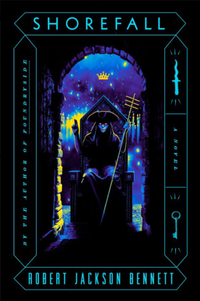The Collapsing Empire by John Scalzi
 Saturday, April 25, 2020 at 11:49PM
Saturday, April 25, 2020 at 11:49PM 
Published by Tor Books on March 21, 2017
The Collapsing Empire is the first book in a trilogy. The last book was recently published. I’ll read it after I finish the second novel, which (like the first one) the publisher kindly provided for review.
Interstellar travel in the Interdependency trilogy is possible because certain places in the universe are connected by navigable streams (“rivers of alternate space-time”) called the Flow. Each stream moves in one direction but is conveniently paired with a stream that moves in the opposite direction.
Humans established a presence in a few dozen star systems by traveling to them via the Flow. In most systems, humans live underground or in orbiting habitats. The humans in each system trade with humans in other systems through the Flow streams. All the humans belong to the Holy Empire of the Interdependent States and Mercantile Guilds, also known as the Interdependency.
While the streams remain stable for a considerable time, they sometimes shift or disappear. The stream to Earth collapsed about a millennium before The Collapsing Empire takes place. Another stream collapsed a couple of hundred years later, causing the loss of contact with the inhabitants of that system. The remaining systems of the Interdependency rely on the Flow for trade, and none of those habitats have sufficient resources to enable their long-term survival if they were cut off from the others.
The human presence at the center of the Interdependency (where flow streams converge) is called Hub, while the habitat that is farthest from the others is called End, because future humans are remarkably unimaginative. End is the only place on which humans actually colonized a planet. If the Flow streams disappear, End is the last hope for survival of the humans living in the Interdependency.
The imperial dynasty for some time has been the House of Wu. The emperox has ruling authority throughout the empire, although the emperox is advised by an executive committee that represents the legislature, the church, and trade unions. The emperox dies early in the novel, making his illegitimate daughter Cardenia the new emperox. It is a job she doesn’t particularly want.
So that’s the background against which the trilogy is set. The background, however, is about to be disrupted. A physicist named Hatide Roynold concluded that the Flow streams would soon rearrange, establishing End rather than Hub as their nexus. Her research was privately funded by the House of Nohamapetan, which hopes to keep her findings a secret so that the knowledge could be exploited to the family’s advantage. Lord Ghreni Nohamapetan on End and Lady Nadashe Nohamapetan on Hub are the novel’s principal villains.
However, a physicist on End, the Count of Claremont, has been secretly funded by the emperox. Claremont, assisted by his son Marce, determined that Roynold was wrong and that all the streams will soon collapse, isolating each system from every other system. Hence, the novel’s title and the driver of the plot.
Nearly all of this novel is a setup for the story to come. It introduces key characters, including Cardenia, Marce, Lady Kiva from the House of Lagos (a family of traders), and the villains. Political machinations include a couple of attempted assassinations on Hub and a rebellion on End. We learn a bit about Cardenia’s insecurities, revealed largely in conversation with the computer-stored constructs of earlier dynasty members who held the position of emperox. A romance or perhaps just lust begins to blossom between Cardenia and Marce, while lust pretty much defines the personality of Kiva.
The novel is of no more than average length, which makes me wonder whether the story might have been better told as a Dune-length novel rather than breaking it into three books. The book does not work as a standalone because no self-contained story is resolved. That makes The Collapsing Empire difficult to review — it’s like reviewing the first third of a novel — given that whether the novel is a worthy read will depend on the success of the trilogy as a whole. I can say, however, that the novel held my interest, that it moves quickly, and that the premise is intriguing.
RECOMMENDED



